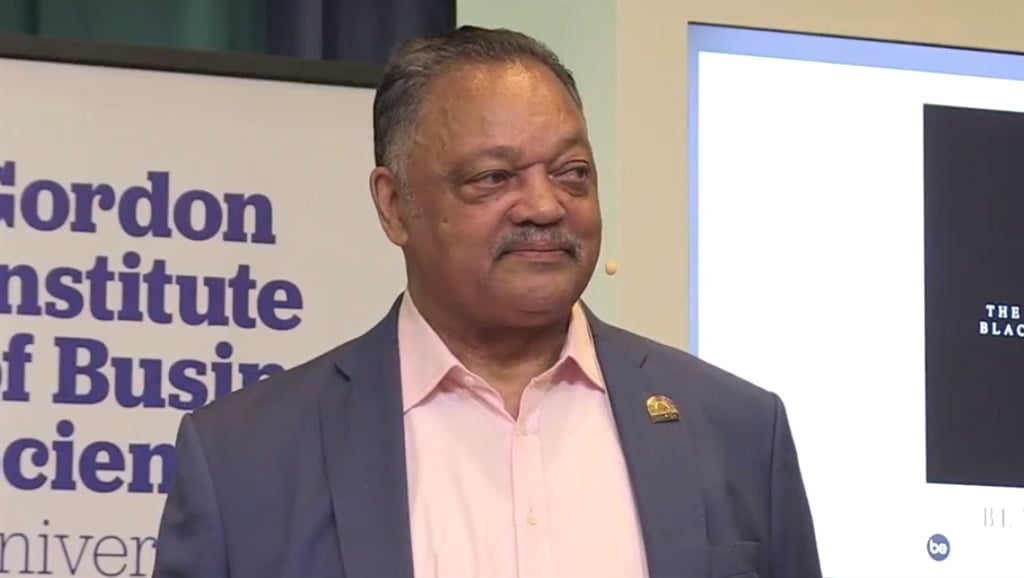
Reverend Jesse Jackson, one of America’s foremost civil rights, religious and political figures, said while the end of political apartheid, where people were separated by race, had been achieved, economic apartheid and a lack of access to economic opportunities still persists.
“We fought and won political apartheid, which gave us freedom. But it had almost nothing to do with economic resources,” Jackson said.
Speaking at a Gordon Institute of Business Science forum co-hosted by the Young Professionals Association and the Ikusasa Le Afrika Foundation, Jackson explained: “The tools used to end political apartheid must now be used to end economic apartheid. We are free, but we are not equal.”
The next stage of the struggle
Drawing parallels between the American civil rights movement and the South African struggle for freedom, Jackson said the next stage of the struggle must allow for access to capital, industry and technology.
“Our segregation struggles have ended, but we are denied access to capital, banks, insurance, access to university and ownership of the mass media. In the last struggle, freedom was not the goal; but we had to be free in order to get equal. But now, whites are richer, and black are free.”
The next level of the struggle needs to be defined:
“The playing field, whether it be access to capital, banking or international trade, is not equal. While the race separation battle has been fought and won; the battle of resource separation has not been fought.”
Tebogo Moalusi, chairperson of the Young Professionals Association, told the gathering that South Africa was on the cusp of a movement of black excellence.
“Young people must take their place at the table where decisions are made. We must make black excellence an obsession until wealth creation, access to jobs and opportunities for black people become a reality.”
Economic emancipation
South Africa had recently lost a number of leaders from the struggle who embodied the ideals of black excellence, Dr Zweli Mkhize, minister of cooperative governance and traditional affairs and the chair of Ikusasa Le Afrika Foundation, told the forum.
“We must draw inspiration from Mama Winnie, who defended the capacity of black people to think for themselves and to be determined. We must thus be inspired by her memory when we speak of black excellence,” he said.
Despite the system of Bantu Education, South Africa has produced a significant number of highly qualified black professionals. The growth of the black middle class is part of the strategy to transform South Africa and to drive economic transformation, Mkhize explained.
However, the country was still far from reaching its goals: “The pace of transformation of the economy is still too slow, and the skewed nature of ownership and leadership patterns need to be corrected. It is not sustainable if the majority of our people are excluded from the economy,” Mkhize said.
He explained that many obstacles prevented black professionals and businesses from entering and participating in the mainstream economy.
“Often, being black means you have to be better to be equal. Corporate South Africa remains an impenetrable fortress where black owned firms struggle to get meaningful contracts. Until these networks are dismantled and the subtle barriers are removed, we won’t be able to transform the economy. We need to see black excellence shining.”
“South Africa needs men and women of integrity to take this country forward,” Mkhize said, addressing the young professionals attending the forum.
“Your contribution must be making our country a better place. It is not about racial principles, but about justice. Don’t see yourself as a helpless bystander, you have more power than you think.”
Democratising the economy
Jackson explained that it was necessary to learn to fight as hard to end economic apartheid, as we did to end political apartheid. However, he warned: “many who were your political allies won’t necessarily be your economic allies.”
“The biggest sector is the private sector, and the next stage of our struggle needs a mindset shift.”
He said large corporations’ procurement lists, budgets and training programmes, as well as legal and other professional services were often overlooked but should be examined to enforce empowerment and transformation.
“We must make large companies aware that they cannot afford to ignore the market. But research and education are sometimes necessary to wake the market up.”
He said an organised, disciplined minority could build a power base from which the next stage of the struggle could be fought: “We have to look at ways to democratise the economy. We must look at the economy anew.”Economic Emancipation:
To watch the full video please go to:




 Publications
Publications
 Partners
Partners








